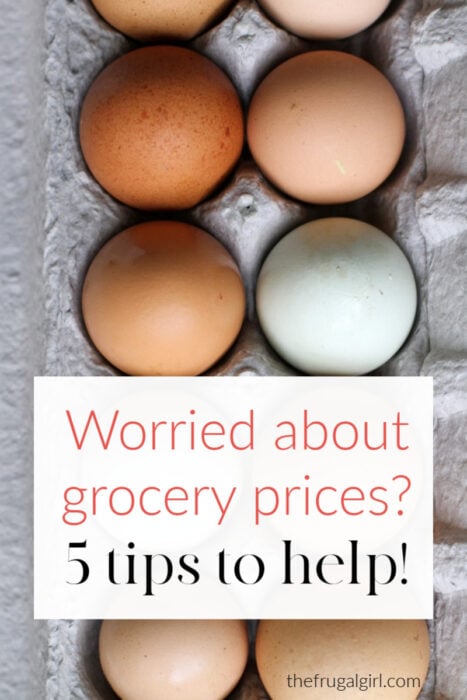
Grocery prices are going up right now, and given the current situation, I will not be surprised if they continue to rise for a while.
This is a little bit unnerving for those of us who are budget-minded (which is probably most of the people reading this blog!)
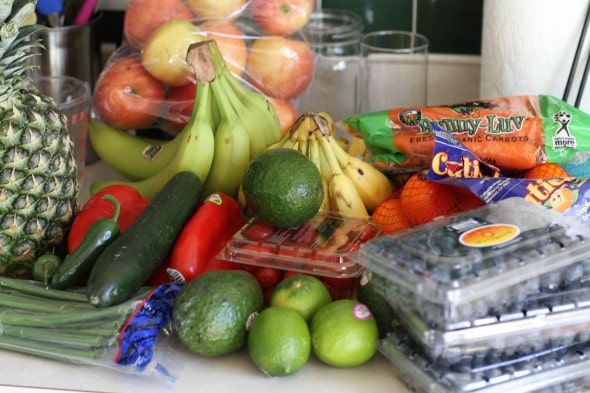
When I feel nervous about something that’s out of my control, I almost always feel better if I think about some related things that are in my control.
For instance, I cannot control the global health situation but I can:
- exercise
- eat good food
- sleep
- follow the recommended precautions
- focus on the good so that I don’t get discouraged
And so on. Controlling the things I can control helps me feel calmer about the stuff outside my control.
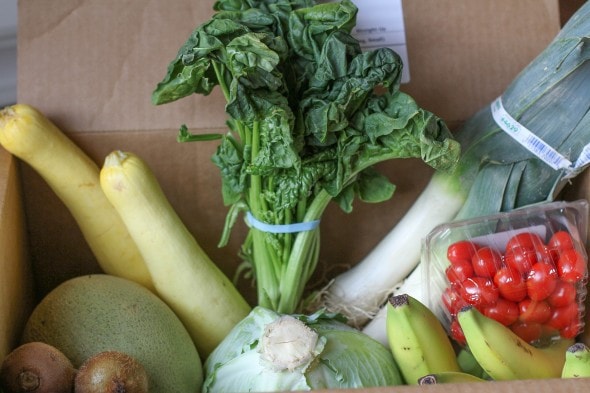
So!
I thought I’d write about a few helpful ways we can react to the rising grocery prices so that we can all feel slightly more in control.
(Even if you don’t actually put any of these options into practice, it can help to know that they are there.)
1. Eat less meat.
Meat prices are certainly rising, and the supply chain for meat is looking a little iffy too.
If prices rise too much or supply issues are too bad, here’s the good news: you can always eat less meat.
(or no meat, obviously!)
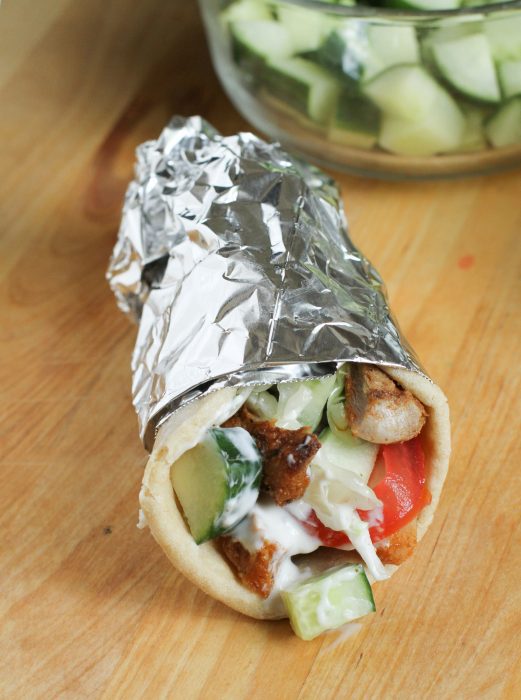
You could make meals that stretch meat, such as:
- salads
- sandwiches
- wraps
- stir-fries
- gyros
- pasta dishes
And you could get more of your protein from other, cheaper sources such as:
- eggs (even pricey eggs are cheaper than most meat)
- beans
- dairy products
- nuts (though these can be expensive if you don’t buy in bulk)
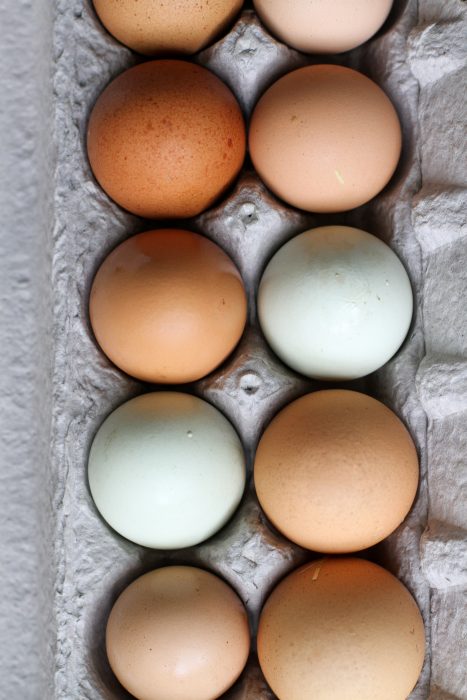
2. Eat foods that are always relatively cheap
If food prices rise 5% across the board, that 5% increase will feel much worse on steak than on cornmeal.
(In the same way, a 5% price increase on a mansion is more significant than a 5% increase on a small cottage.)
It’s like what I was saying about eggs above. Even if the price of eggs goes up, they’re still going to be a cheaper source of protein than beef.
If push comes to shove, you can switch your diet to include things like polenta, bulk oatmeal, eggs, raisins, peanuts, pasta, beans, bananas, carrots, canned tomatoes, and other cheap staples.
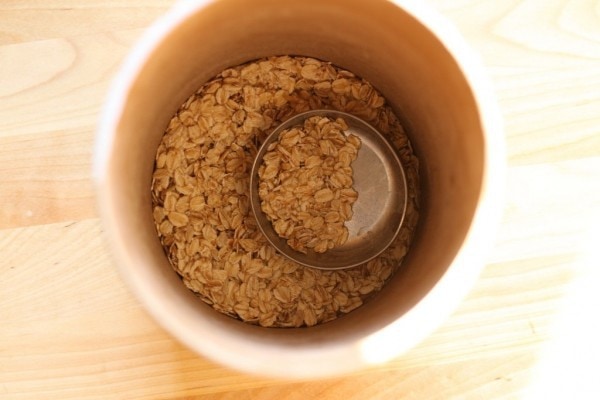
repurposed broken measuring cup, explained more in this post on repurposing kitchen items
3. Drink water
If your grocery budget gets too tight, you can’t stop eating, but you can quit drinking most non-water beverages.
Or you can cut back on them.
Or you can switch to cheaper options (brew your own iced tea, make coffee at home, make juice from concentrate).

Since sweetened drinks are not nutritionally necessary, this is a grocery budget category you can slash without fear of malnutrition.
Actually, you’ll probably be healthier for it!
4. Stop wasting food
Most of us are throwing away a lot of food that could have been eaten. This is real money, going into the trash can or compost.
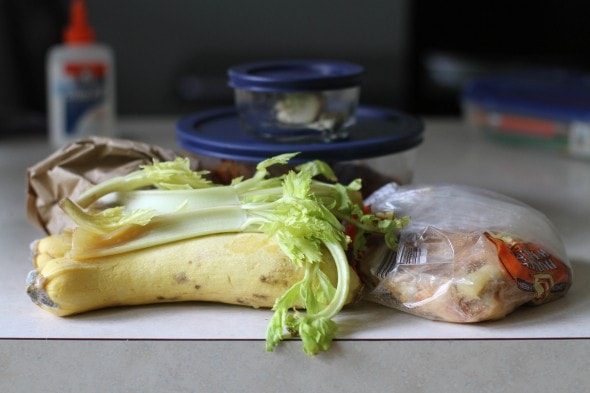
According to futurity.org, the average American household throws out $1866 worth of food each year.
That’s a lot of money that could help stretch your grocery budget.
To get you started, here are my top 10 tips to help you stop wasting food.
And here’s one more food-waste fighting bonus tip.
Ok, never mind, can’t stop. 😉 ONE more: a simple but hard way to avoid food waste.
And if you want to dive deeper, my four-week food waste course could be helpful.
5. Spend less money elsewhere
You cannot control the price of food, and you obviously can’t just stop eating.
This means that to some extent, rising grocery prices will affect you no matter what.
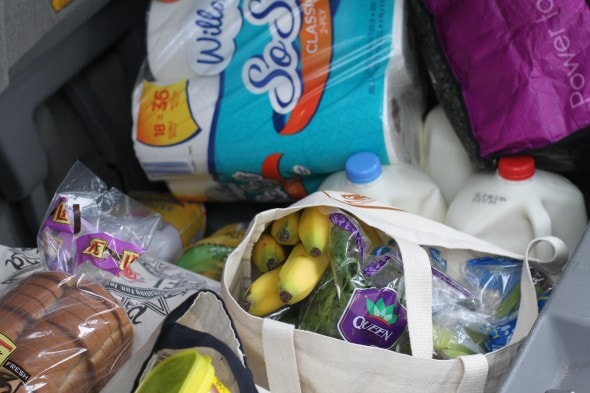
So, you can apply the previous four tips as best you can, but then you could also look for other areas of your budget where you could cut back.
That way, you’ll have more to spend on groceries.
For instance, you could:
- not buy new clothes
- buy used items when you have to shop
- cancel subscriptions
- drive less
- repair instead of replace
And so on.
What other tips would you add to my list?
P.S. I am currently not doing a super bare-bones kind of grocery shopping; I’m still buying fun foods for my girls because I can. If you can afford that, and fun foods are helping your family’s mental state, then go for it! I’m just sharing the tips in this post so that you’ve got something to fall back on if things get more serious for your food budget.

Molly
Tuesday 16th of June 2020
These are all so helpful! I don't eat meat at all and save so much money because of it. If needed, all takeout could be cut, convenience foods such as veggies burgers, frozen pizzas, and other frozen / prepackaged meals could be replaced for cheap soups made in batches and frozen. I'm thinking a split pea, white bean and mirepoix, or veggie and rice would be good. I like to make veggie stock from scraps of vegetables and herbs which can easily be made into a flavorful and filling miso soup with miso paste, soy sauce / tamari / coconut aminos, hot sauce/siracha, and green onions, along with any mushrooms, peppers, or tofu left in the fridge. Eating foods raw is more filling (Think about 2 cups of spinach in a salad versus 2 cups of cooked spinach in pasta).
Isa
Saturday 23rd of May 2020
Grocery shop only once a week. I used to go 2-3 times a week and everytime I would buy more than I intended. Going only once sure reduces impulse buying and saves money. Also forces me to use all the food at home (pantry, freezers) instead of hoarding it (or waste it)
sea
Saturday 23rd of May 2020
Hi, Kristen! Just wanted to say thanks for linking to all those relevant, older posts! It gives me more to read; and I've got lotssss of time to read these days! :-)
Kristen
Saturday 23rd of May 2020
I'm so glad you are enjoying the extra posts!
Papa Foxtrot
Friday 22nd of May 2020
Ziploc bags can be used to help you freeze your food and prevent spoilage. My wife and I do that with almost every vegetable we buy and we almost never throw out food.
Sharon
Friday 22nd of May 2020
Enjoying a bowl of oatmeal this morning with applesauce in place of milk and a dash of cinnamon and some raisins.